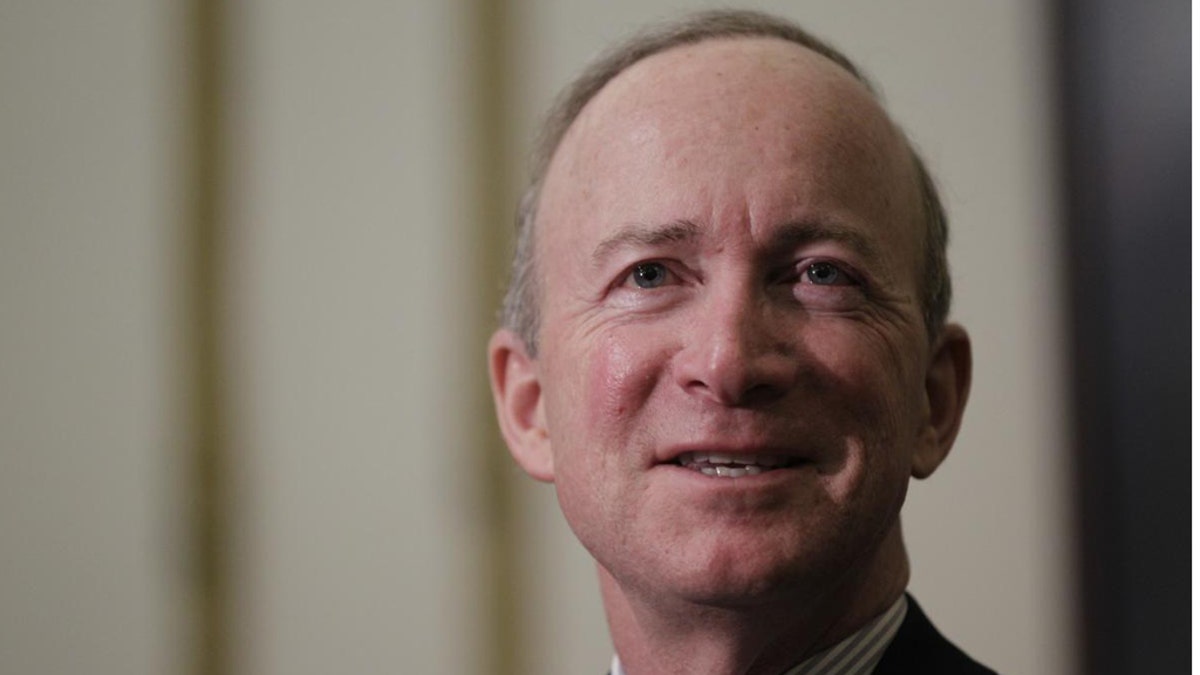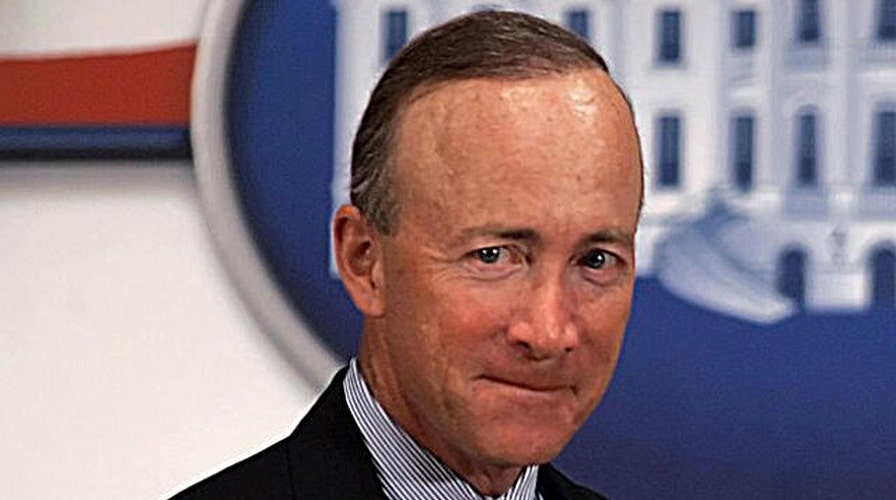US colleges grappling with how and when to return students to campuses
Universities are carefully weighing their options for the fall semester; Hoover Institution Fellow Lanhee Chen reacts.
Get all the latest news on coronavirus and more delivered daily to your inbox. Sign up here.
Mitch Daniels, the former Republican governor of Indiana and current president of Purdue University, wrote in a Washington Post op-ed Tuesday morning that failing to reopen the university for students this fall would be "an unacceptable breach of duty," citing statistics on how the coronavirus mostly affects older people and not the 18-22-year-old cohort that attends colleges like his.
Daniels has previously made clear that he intends to open the Indiana school for students in August with a number of measures to reduce the density of the population and protect those in vulnerable groups.
His plea in the pages of the Post comes as an increasing number of voices – largely from the right side of the political spectrum – are calling for as close to a resumption of business-as-usual as possible, as soon as possible, warning against the economic and human costs of keeping people locked down in their homes in order to stem the spread of the virus.
"Forty-five thousand young people — the biggest student population we’ve ever had — are telling us they want to be here this fall," Daniels wrote. "To tell them, 'Sorry, we are too incompetent or too fearful to figure out how to protect your elders, so you have to disrupt your education,' would be a gross disservice to them and a default of our responsibility."
CORONAVIRUS: WHAT YOU NEED TO KNOW

Former Republican Indiana Gov. Mitch Daniels, who is now the president of Purdue University, wrote in the Washington Post Tuesday morning that it would be "unacceptable" for the school to fail to remain closed to students in the fall.
Daniels' piece also comes as universities and college athletics programs around the country are weighing whether or not to send their students back to campus or resume competition in just under three months in the wake of a spring semester highlighted by remote commencements and online classes many students have derisively dubbed "Zoom University." For student-athletes, seasons – and for seniors, athletic careers – were cut short.
Purdue's Big Ten counterpart, Penn State, recently circulated a survey asking 17,000 students their thoughts returning to campus in August, according to The Daily Collegian, and has said it will have a finalized plan by June 15. ESPN reported last week that Ohio State, also a Big Ten school, is considering plans that could see between 20,000 and 50,000 fans in its enormous football stadium that has a capacity of nearly 105,000. The university itself, according to The Lantern, has not committed to any reopening plans yet.
Central to Daniels' case to open Purdue for students this upcoming semester is the disproportionate impact of the coronavirus on older people, while it largely spares the young from its worst effects.
"At the point when the campus was shut down, if we had needed to decide on our plans for the fall, we would have felt compelled to resume with remote instruction and keep the campus closed," Daniels wrote. "For all we knew, COVID-19 posed a danger across all lines of age and health status, and a place as densely populated as our campus would be defenseless against it — operations couldn’t be responsibly restarted."
WHITMER EXTENDS MICHIGAN'S STAY-AT-HOME ORDER UNTIL JUNE 12
He continued: "We have all learned a lot since then. What would have been a reckless and scientifically unjustified decision in late March is now plainly the best option from both a scientific and a stewardship standpoint, at least for our particular institution... this bug, so risky in one segment of the population, poses a near-zero risk to young people. Among covid-19 deaths, 99.9 percent have occurred outside the 15-to-24 age group; the survival rate in the 20-to-29 age bracket is 99.99 percent."
Liberty University, a Christian school in Virginia that welcomed a small number of its students back to campus this spring in a much-criticized decision, was largely successful in keeping coronavirus cases to a minimum.
"We really became the model," Liberty President Jerry Fallwell told Fox News' Laura Ingraham last week. "We had all takeout at our restaurants. We had social distancing. All the academic buildings were open so they could spread out. And ... it worked perfectly."
Daniels, while bringing students back West Lafayette, Ind., said the school will still undertake significant steps to make its campus less susceptible to a potential coronavirus outbreak. He said the school will "redesign" its classrooms and dorms, offer its largest classes online, implement testing and contact tracing programs and halt most large gatherings like "concerts, convocations and social occasions."
"It will be a quieter fall without fraternity parties," Daniels wrote, "but first things first."
There will also be mask and hygiene requirements, extra cleaning and other measures taken by the school.
Daniels' plan appears to be the kind of local initiative President Trump has asked for as he pushes governors to "REOPEN OUR COUNTRY!" on a near-daily basis, despite reopening guidelines released by the White House which lay out specific benchmarks for reopening that many states have not yet met. Just this weekend, Trump threatened to "override" governors – under uncertain authority – who do not allow churches, synagogues and mosques to resume normal activities amid the pandemic.
Trump said that new guidance would consider houses of worship "essential" and called on governors to let them open "right now."
Many governors, however, have been reluctant to reduce coronavirus restrictions in their states, including Michigan Democratic Gov. Gretchen Whitmer, who this weekend extended her state's stay-at-home order to June 12.
"If we’re going to lower the chance of a second wave and continue to protect our neighbors and loved ones from the spread of this virus, we must continue to do our part by staying safer at home," she said.
National Institute for Allergy and Infectious Diseases Director Dr. Anthony Fauci also warned earlier this month in a Senate hearing that localities that jump the gun on lifting restrictions could cause preventable "suffering and death" and "turn the clock back instead of going forward."
CLICK HERE TO GET THE FOX NEWS APP
"Depending on the dynamics of an outbreak in a particular region, state, city or area, that would really determine the speed and the pace with which one does reenter or reopen," Fauci said. "If some areas – cities states or what have you – jump over those barriers, checkpoints and prematurely open up without having the capability of being able to respond effectively, and efficiently, my concern is that we will start to see little spikes that might turn into outbreaks."
Daniels, in his op-ed for the Post, expressed confidence that his school would have the resources to undertake the responses Fauci spoke about, and said he understood that not every university could plausibly take the same measures he could at a massive state university like Purdue.
"We recognize that not every school can or should view the decision to reopen as we do," he wrote. "Unlike Purdue, many colleges were already struggling with low enrollment and precarious finances when the pandemic hit. But given what we have learned, with 45,000 students waiting and the financial wherewithal to do what’s necessary, failure to take on the job of reopening would be not only anti-scientific but also an unacceptable breach of duty."
Fox News' Marisa Schultz, Victor Garcia and Louis Casiano contributed to this report.















































